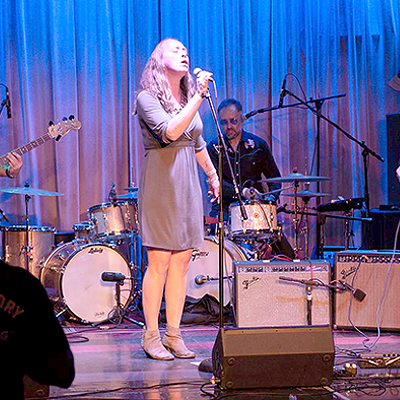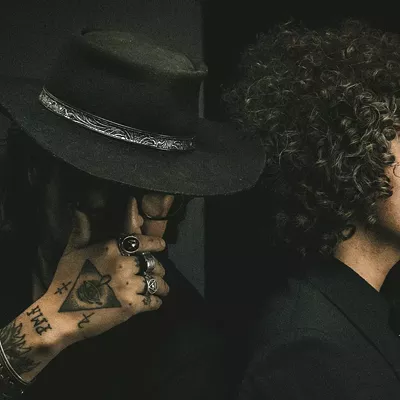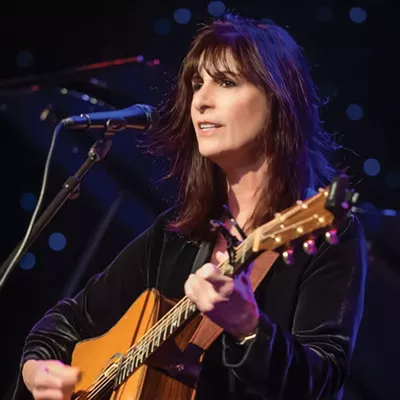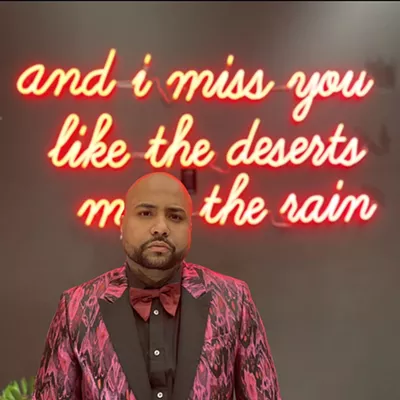Ian wrote Roberta Flack's 1974 hit, "Jesse," then touched teenaged psyches with the poignant "At Seventeen." She even had an international disco hit, "Flying Too High," from the soundtrack of the movie Foxes, which starred Jodie Foster. Her latest album, God and the FBI, is her 17th and the second of a seven-record deal with Windham Hill. It includes "Memphis," a heartfelt duet with Willie Nelson, and the hilarious country music tribute "Boots Like Emmy Lou's."
America was first introduced to Janis Ian by composer-conductor Leonard Bernstein on national television in 1967. Bernstein championed the unknown teenager's controversial "Society's Child," a plaintive song about interracial male/female relationships. Striking a resonant note in an era when such behavior could still get you killed, Ian had a Number One hit, as well as articles in Life, Look, Time and Newsweek, by the time she was 17.
She had actually started her prodigious career even earlier. Unlike many musicians of that era, Ian was already well down her path before ever seeing the Beatles. She started playing the piano as a toddler, then switched to guitar at 10. In 1964, Broadside magazine published the 13-year-old's song "Hair of Spun Gold."
Ian says, "I knew I wanted to be a singer at 12 and I think I looked at the album credits one day and realized that they had written the songs, too. So I said, OK. You know, most kids write. It's just that most kids don't then get obsessed with it and make it their life's goal."
The writer's life has indeed been a passion for Ian. Today she is an acknowledged spokesperson for the singer-songwriter genre, thanks to her long-running "Risky Business" column in Performing Songwriter magazine. She's had nine Grammy nominations so far and has no intention of slowing down.
"There's nothing that really beats it, if you're a writer," she said. "I think there could be an earthquake and the roof could cave in around you and if you're working on something good, then you don't care. There's an in-tune metaphysical connection with the universe that you don't get anywhere else. Maybe people get it when they meditate, I don't know. But for somebody like me and the other writers I know, there's a sense of being congruent with your life and your heart that you don't get anywhere else. You don't hurt anybody. You're not really answerable to anyone. It's a pretty good job."
Ian's typical day in Nashville involves getting up early and either hosting or heading over to a co-writer's house. "We get together around 10, shoot some ideas around, try and get something started, break for lunch around 12 or 1, and then come back and keep working," she says matter-of-factly.
Over the course of her career, Ian's miscues and triumphs have become legendary. She turned down the opportunity to write the music for The Graduate (Paul Simon took it). She opted to not play Woodstock. She passed on recording "You Light Up My Life" (Debby Boone caught the megahit instead). On the other hand, when Martin Luther King Jr. was killed, she reportedly spent the night playing guitar with Jimi Hendrix. She was the first musical guest on Saturday Night Live. The multitude of musicians she's worked with includes Chet Atkins, Leonard Cohen, Chick Corea, James Brown, Mel Tormé and Ani DeFranco.
Ian opted to take a hiatus from the music industry in 1982.
"I had been on the road for 10 years and I wanted to turn my attention back to writing," she explained. "It's very difficult to write on the road, to maintain any sense of creativity when your entire day is always scheduled around how wonderful you are. It's not good for your work."
She studied acting and directing, took a little ballet. Eventually, she began co-writing with various Nashville cats, building a respectable string of hits for other people and a nice income. She finally moved to Nashville in 1989.
"It's a good town to live in if you're an artist," she stated. "There are lots of other artists. There are banks and mortgage lenders who understand how royalty flow works. It's a community that values you and the industry that you bring to town. Most places, if you're a songwriter, you're just weird. In Nashville, you're normal."
This summer, Ian will be touring heavily, mostly playing the festival circuit.
"I approach performing as a performer," she explained. "I try not to approach it as a songwriter, because I think then you cheat your audience. The audience doesn't care about the songwriting process. They're paying for a show. They're paying to be entertained, to be moved. If I don't go in to give them that, then I'm not earning my keep. I should stay home and be a writer."
She boils down the thousands of words she's written in her columns about songwriting to simple advice.
"Work hard," she says without hesitation. "There's really no other advice you can give somebody, other than work hard and don't be satisfied too easily. The rest of it is up to the individual.
"Inspiration is cheap. Ask any writer. That's the cheapest part of the whole process. There's a zillion things to write about. It's writing about them in a way that is communicative and universal and coherent that's tough."
















